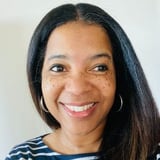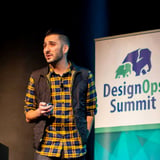Summary
In this panel, Marina recounts her multi-year experience navigating bureaucracy at a large organization, emphasizing that meaningful, lasting change requires perseverance rather than quick fixes like high-level sign-offs. Mariah stresses the ethical responsibility of creators to avoid weaponizing technology, using examples like Cambridge Analytica to illustrate unforeseen consequences. The speakers agree that cultural change starts with leadership enabling open conversations and setting examples. They highlight the critical, sometimes resistant, role of middle management and the need to align their incentives with organizational goals. The panel underscores the value of being the persistent, sometimes uncomfortable, voice asking tough questions. Advice includes building coalitions, reading the room, and focusing on people and purpose rather than rigid tools or labels. Marina, Mariah, and others advocate for caring deeply about the impact of one's work and taking personal responsibility, with calls to action for everyone to engage meaningfully both inside and outside work.
Key Insights
-
•
Meaningful change in large organizations often takes years and cannot be rushed with top-level sign-offs alone, as Marina experienced with a two-and-a-half-year journey.
-
•
Creators must be vigilant about the potential weaponization of their products, as illustrated by Mariah’s cautionary reference to Facebook’s API misuse and Cambridge Analytica.
-
•
Leadership buy-in is critical to establishing a culture that encourages ethical thinking and user-first approaches in tech and design work.
-
•
Middle management can be both a barrier and an opportunity in adopting design thinking and ethical frameworks, often requiring role and incentive realignment.
-
•
Small daily conversations about user impact and ethics can cumulatively lead to larger organizational changes over time.
-
•
Being the 'pain in the ass' who asks uncomfortable questions is necessary for healthy teams and organizational growth, though it requires strategic communication and coalition-building.
-
•
Organizations should not rely solely on buzzwords like 'design thinking' but focus on the core goal of doing right by users and stakeholders.
-
•
Organizational change benefits from understanding what drives individuals within the system and aligning those motivations with ethical goals.
-
•
Personal responsibility is crucial as no one else will ensure ethical considerations are prioritized in technology creation.
-
•
Technology is easy relative to the challenge of managing people and cultures; empathy and care are essential for meaningful impact.
Notable Quotes
"It doesn’t matter whether we are creating an application for sending messages or providing health care; what we do can sometimes mean someone’s life or death."
"No amount of bringing even President Obama to sign paperwork would have changed what really needed to happen."
"If my call to action meant anything, it’s to be the person who asks the question in your organization."
"I am known as that pain in the ass wherever I walk in, but you need those people who speak up and stand up."
"You have to learn to read the room and understand what drives the people you’re working with to build coalitions."
"Leadership must plant the seeds and water the message repeatedly for long-term cultural change."
"Middle management has an ethical responsibility to either adopt new ways or be replaced if resisting change."
"Focus on the reason behind using tools rather than the tools themselves; people and context matter more than labels like design thinking or agile."
"Technology is easy, people are not dealing with people, it takes a lot out of everyone."
"It is your job because no one else is coming to ensure we do the right thing with what we build."
Or choose a question:
















More Videos

"Meetings don’t exist for decision making but for brainstorming, catching up, and one-on-ones."
Ana FerreiraDesigning Distributed: Leading Doist’s Fully Remote Design Team in Six Countries
January 8, 2024

"Some people said I don’t think I’m qualified enough to observe research sessions despite training."
Roy Opata OlendeHow Zapier Uses ‘All Hands Research’ to Increase Exposure to Users
August 6, 2020

"Designers focus on shipping and don’t have bandwidth for documenting learnings or synthesizing knowledge across products."
Kit Unger Jackie Ho Veevi Rosenstein Vasileios XanthopoulosTheme 2: Discussion
January 8, 2024

"I met with my partners and leaders to really dig into their hopes, fears, and dreams about where they wanted to go."
Abbey Smalley Sylas SouzaScaling UX Past the Size of Your Team
January 8, 2024

"Elizabeth Churchill framed AI as a pedal assist system, helping us go further and faster but sometimes needing to dial it back."
Helen ArmstrongAugment the Human. Interrogate the System.
June 7, 2023

"Film is not just a way to capture information, it’s a way to think about information."
Bas Raijmakers, PhD (RCA) Charley Scull Prabhas PokharelWhat Design Research can Learn from Documentary Filmmaking
March 11, 2022

"Power dynamics exist in every session. People don’t want to be embarrassed or feel put on the spot."
Mila Kuznetsova Lucy DentonHow Lessons Learned from Our Youngest Users Can Help Us Evolve our Practices
March 9, 2022

"Qualitative synthesis is like watching a movie in a cinema; AI synthesis feels like watching a recap on YouTube—fast but missing the immersive experience."
Weidan LiQualitative synthesis with ChatGPT: Better or worse than human intelligence?
June 4, 2024

"Regularly ask yourself and your colleagues: what are the goals and what are the fears? That’s how you find a path forward."
Christian CrumlishAMA with Christian Crumlish, author of Product Management for UX People
March 24, 2022



















